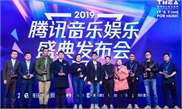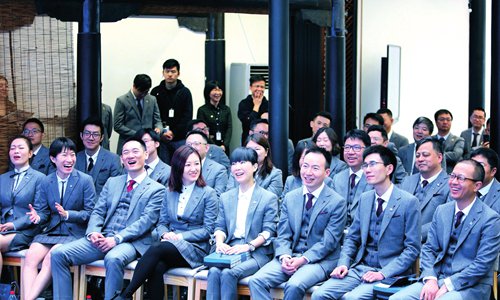
Students from the class of 2019 at Hupan University's opening ceremony in Hangzhou, East China's Zhejiang Province in March Photo: VCG
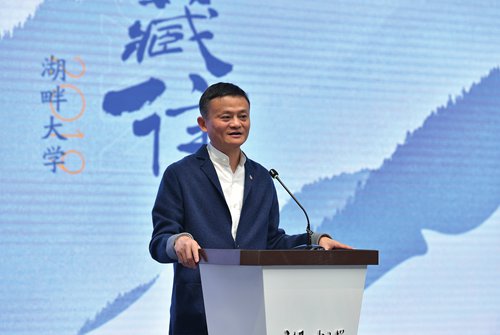
Jack Ma speaking at the opening ceremony of Hupan University in March photo: VCG
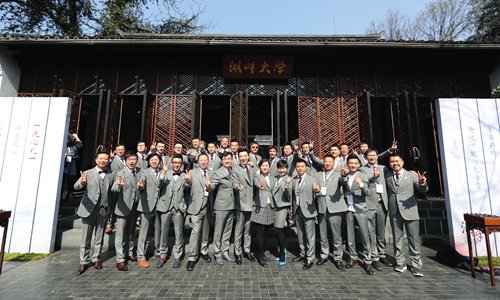
Students from the class of 2017 at Hupan University take a group picture. File photo: VCG
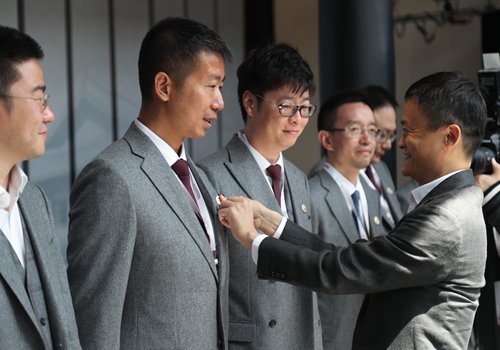
Alibaba founder Jack Ma Yun, pins school badges on students on the first day of classes at Hupan College in Hangzhou, capital of East China's Zhejiang Province, on Monday. Ma serves as the school's president. The 44 students are in the early stages of running their own businesses, covering about 30 industries. Photo: CFP
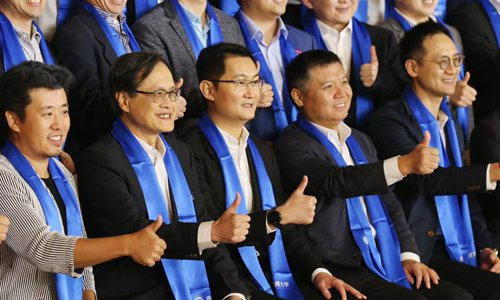
Qingteng University's honorary president Pony Ma Huateng takes a group photo with students in April. Photo: Courtesy of Tencent
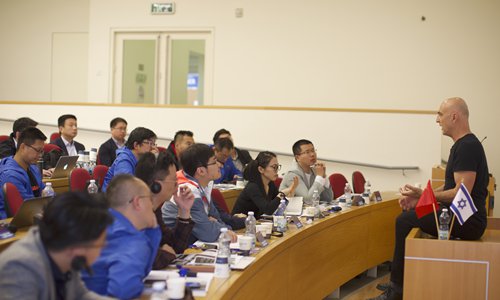
Students of Tsinghua-Qingteng Future Technology Lecture attend a class in Israel in April. Photo: Courtesy of Tencent
It is evident that over past years, universities which were financed and set up by enterprises, also known as corporate universities, have been gaining momentum in China.
Meituan Dianping, operator of the country's largest food delivery app, announced the official establishment of Meituan University on October 15. The company's co-founder Mu Rongjun will head the university.
It will have eight colleges and cover a wide range of sectors centered on Meituan's core businesses including catering, delivery and wine, according to a statement the company sent to the Global Times.
On the same day, ByteDance, the parent company of TikTok, also launched its "Zhichun Class." The class is open to founders of companies from industries related to the internet, Internet of Things, 5G and artificial intelligence (AI), according to a report from domestic news site awtmt.com.
The two are not newcomers. Four years ago, Tencent established Qingteng University, which is the "only company-level university focused on founders and entrepreneurs that is committed to providing a lifelong learning platform for the creators of cutting-edge industries," the company told the Global Times.
In 2015, Alibaba's founder Jack Ma Yun and eight of his business and academic associates established Hupan University in Hangzhou, East China's Jiangsu Province, and Ma was elected head of the university.
Against the backdrop of the rapid development of Chinese enterprises, the number of corporate universities in the country is climbing. In 2012, there were just 1,186, but the number is expected to surpass 3,000 in 2019, according to awtmt.com, citing research results from the Qianzhan Industry Research Institute.
"Corporate universities are not traditional universities, and they are not parallel to the current education system. They intend to train and develop people that can really be used for work and production, and are more practical rather than theoretical," Liu Dingding, a Beijing-based independent industry analyst, told the Global Times on Tuesday.
Corporate universities are usually built around firms' core businesses, which means they can have a say on the industry they're involved in and update students with first-hand industry information, Liu said.
Open to 'outsiders'
Li Yi, chief research fellow at the Internet Research Center under the Shanghai Academy of Social Sciences, told the Global Times on Tuesday that corporate universities are not a new concept, as many Western technology giants created similar universities years ago, including Intel and Microsoft.
According to media reports, the first corporate universities were created more than 60 years ago, with General Motors opening the first in the mid-1950s. McDonald's Hamburger University debuted in 1961, and Disney University and Motorola University were set up in the 1970s.
Unlike these corporate universities created by Western companies, which serve as places for employees to improve skills and learn their company's vision and business goals, Li noted that corporate universities in China developed in a different direction - they are also open to qualified outsiders who pass their selective tests.
Tencent said in a statement sent to the Global Times that applicants for its university must be a founder, chairman or CEO of an entrepreneurial project that has completed Series-A financing (or equivalent). Additionally, applicants must undergo multiple rounds of screening before they can finally be admitted.
Tencent said that it once had to select 48 successful applicants out of a pool of over 1,000, at an admission rate of only 4 percent. This rate is even lower than some Ivy League universities.
The entry requirements for Hupan University are even stricter. An eligible applicant must be the founder of a company that is at least three years old, has more than 30 employees and an annual revenue of over 30 million yuan ($4.25 million). On top of that, applicants also need to provide proof of their business' tax payments and provide three recommendation letters, at least one of which must be from the University's list of certified referees.
Those who are of an acceptable standard and lucky enough to become an eligible applicant finally progress to the interview stage.
With such strict admission requirements, enterprises can either take this as an opportunity to select potential investment candidates or they could help applicants they have already invested in, help them establish connections and guide their development to gain higher returns, Li said.
"They could also form powerful [groups] through the students they admitted, who are already experienced and successful entrepreneurs," said Li.
Since its establishment in 2015, Qingteng University has educated a total of 393 students, including Huang Zheng, founder of Chinese e-commerce firm Pinduoduo, and co-founder of TAL education Liu Yachao; the total valuation of the 393 students' companies has exceeded 1.7 trillion yuan, according to a document Tencent sent to the Global Times on Tuesday.
Graduates will also be significant resources for corporations such as Tencent to establish an empire with an easy entrance to all walks of life, analysts said.
Networking crash course
For many adults who have worked for some time, the key motivation to attend a corporate university is gaining access to the internal resources of big companies and building relations with other industry players who could potentially be helpful to their businesses, Liu said.
Industry observers also said that, for entrepreneurs, corporate universities are a crash course to understand how to run a business. They gain the opportunity to conduct deep communications with important figures such as Alibaba's founder Jack Ma Yun.
The price of such an opportunity, however, is not cheap. Hupan University charges a 350,000 yuan attendance fee, and Qingteng University charges 500,000 yuan per student.
Sun Yuchen was one of the first graduates from Hupan Universtiy. Sun is a young Chinese entrepreneur who sparked heated public discussion after casting the winning bid for, and then cancelling, this year's lunch with US financier Warren Buffett.
Also the founder of blockchain platform Tron, Sun told the Global Times on Tuesday that the training he received at the university was "extremely beneficial" in helping him manage, develop and expand his start-up.
"Each member of the school board, or the 'big names' of the industry, opens different courses based on their knowledge and expertise, and most of the classes are about sharing the experiences they accumulated as a mature entrepreneur. I learned a lot from them," Sun said.
As the management of a blockchain company is similar to that of a traditional or internet firm, Sun said that he was able to successfully apply the knowledge he learned at the university to the management of Tron. The company now employs 500 personnel, compared with 30 when established.
"It's kind of like a stepping-stone to success. You gain internal resources after studying at the college and then coordinate them well to meet your own development goals," Liu said.
"Moreover, being enrolled in the university is itself a recognition of their standing in the market," Li said, adding that companies also have a greater chance of receiving investment funds after being selected by top firms - the companies that run the universities.
One of Qingteng University's aforementioned alumni, Huang Zheng from Pinduoduo, was able to secure a large investment from Tencent.
The Shanghai-based company, amid the highly-consolidated Chinese e-commerce market, filed for a massive $1.6 billion IPO on the US stock market on July 16, 2018, marking one of the largest deals of last year.
Another alumnus, Qu Fang, co-founder of the online social commerce site Xiaohongshu, secured an investment worth $100 from Tencent.
When heat fades
Although many consider corporate universities to be a win-win opportunity for both applicants and companies, there is still the argument that too many "cliques" led by top firms will not encourage fair competition and innovation in the business world, industry insiders cautioned.
If just being accepted to Hupan University can enable someone's project to be endorsed by industry giants, that's not fair, Li explained
Li said that it is also difficult to say how long these universities will last in the future. "It really depends on how graduates and applicants look at the value of the courses."
Corporate universities as a whole do not share the same development path.
For instance, Meituan University has lower barriers for its applicants, with the ambition of training qualified employees for the industry. This is in stark contrast to some of the university's counterparts that are only open to those who come from top management in successful enterprises.
According to the data provided by Meituan, 70 percent of its university's trainees will be from small and medium-sized enterprises, who are eager to learn digital skills.
The company told the Global Times on Tuesday that most of its courses are free.


